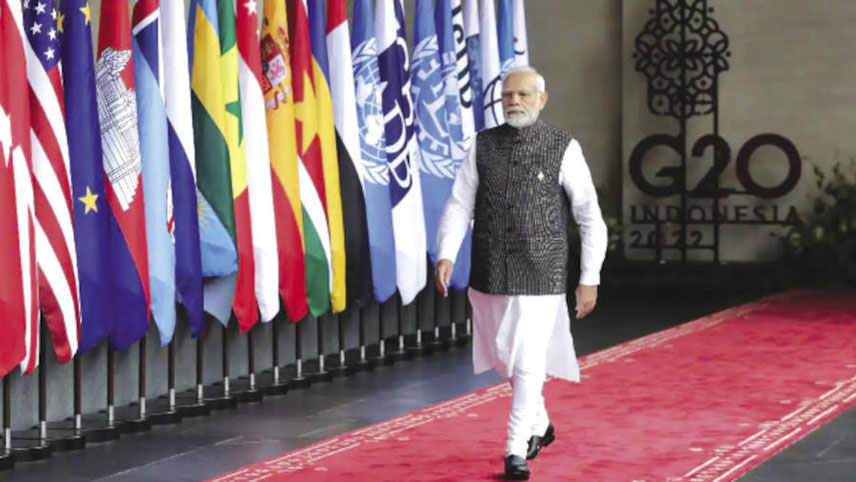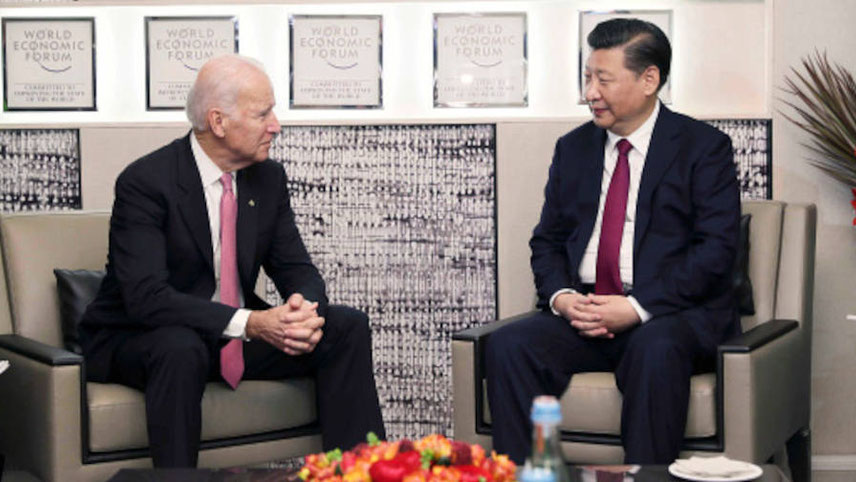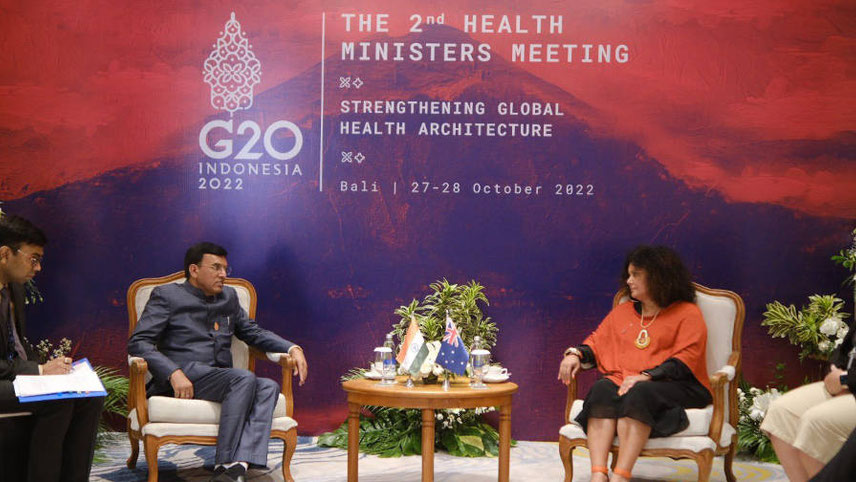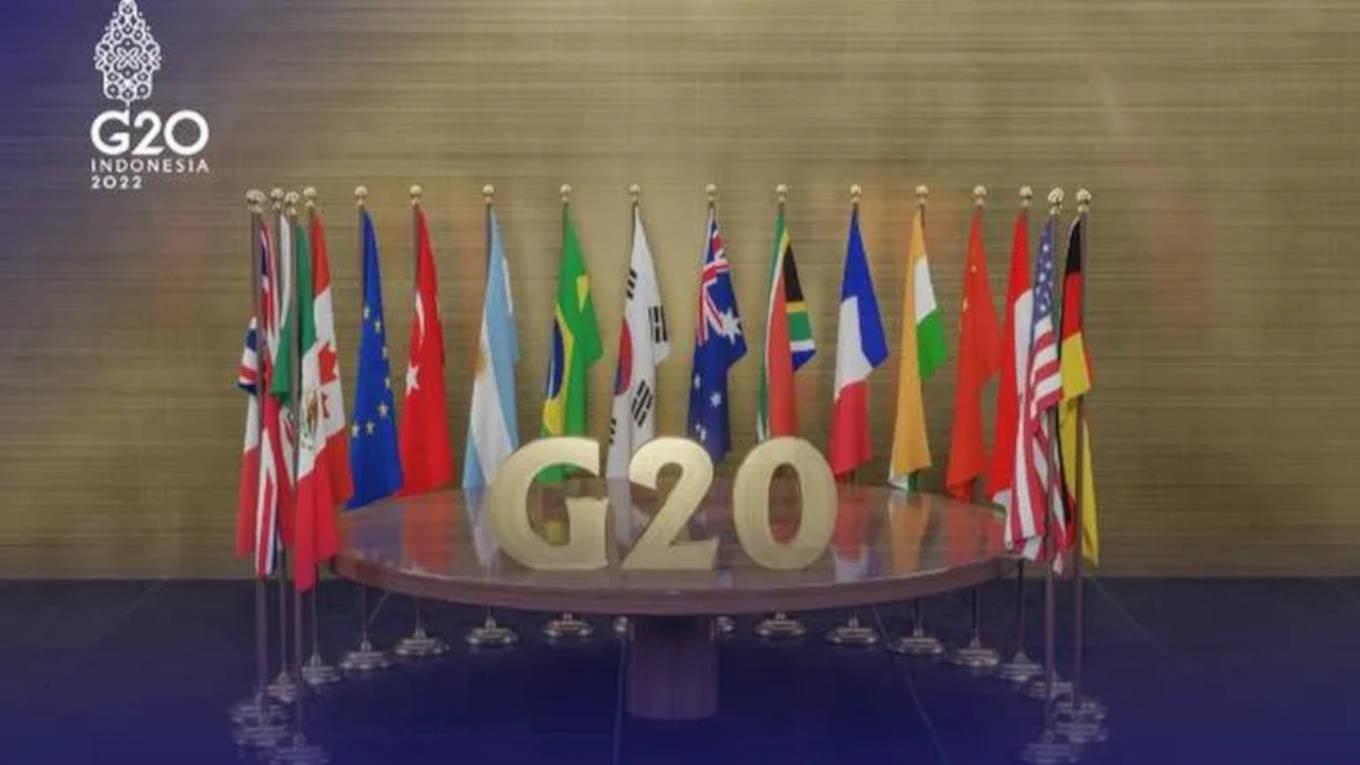-

Modi: Today, I want to assure that India’s G20 presidency will be inclusive, ambitious, decisive, and action-oriented
Biden-Xi meeting
Against this backdrop, a significant initiative to solve concurrent crises in energy, climate and food would have been a miracle in Bali. As it is, the bar for outcomes at such multilateral gatherings has been low. In the recent past too, the G20 has often swapped meaningful action for verbose statements. However, the gatherings have remained an opportunity for formal and informal diplomatic activity.
That has rarely mattered more than this year, when communication among some leading players has been scarce and deterioration of relations swift. The opportunity for Chinese leader Xi Jinping to meet his US counterpart for the first time since Joe Biden became president was no small deal. Even without concessions from either side, a tete-a-tete provided a rare chance to steady relations.
The meeting was conciliatory by all accounts with Biden promising there will be no ‘new Cold War’ with China. He also said he did not believe China would invade Taiwan. The pair also discussed North Korea and Russia’s invasion of Ukraine. Both said they opposed the use of nuclear weapons in Ukraine. Xi, who has been urged to talk down Putin, reiterated China’s calls for peace while adding there was ‘no simple solution to a complex problem’.
Host Indonesia had hoped this summit would cement its position in the global order and President Joko Widodo’s legacy as a statesman. That optimism was dashed the moment Russia invaded its neighbour. Jokowi got a measure of the challenge with his visit to Kyiv and Moscow over the summer, when he offered to act as intermediary and sought grain and fertiliser promises, but left with little to show for his trouble. Prime Minister Modi will now have to keep that in mind.
India’s moment
India, which is set to assume presidency of G20 on 1 December, now thinks that this is its big moment on the world stage. “India’s G20 presidency hopes to provide new strength, direction and perspective to G20 discussions on diverse subjects, which include green development, lifestyle for environment, digital transformation, inclusive and resilient growth and more importantly greater voice for the global south in issues of international economic cooperation as also on the need for reformed 21st-century institutions,” said Vinay Kwatra, Foreign Secretary, on the eve of the Bali summit.
Vivek Katju, former secretary, ministry of external affairs, gives a more nuanced view, pointing to Prime Minister Narendra Modi’s remarks at the unveiling of the logo, theme and website on India’s G20 presidency. Through his remarks, Modi wished to accomplish two objectives: one, convey to the group that India is going to take its presidency seriously; and, make it known to the country that the summit to be held in India will be a big ‘opportunity’ and a matter of ‘pride’ for all Indians.
Whether India’s presidency will translate into diplomatic and political gains for Modi is a moot point. This is not the first major multilateral summit that the country will be organising, though it happens to be the first under Modi. Two earlier summits were the Non-Aligned Movement (NAM) and the Commonwealth Heads of Government (CHOGM) of 1983. Both were successfully organised and were important initiatives for the foreign policy that the country pursued then.
The Asian Games of 1982 in New Delhi were also an expression of India’s growing stature and soft power. But that didn’t help Indira Gandhi overseas as she was criticised globally for her handling of the Punjab problem.
-

Biden’s tete-a-tete with Xi: a rare chance to steady relations
The 2023 summit in New Delhi will mark the culmination of India’s leadership of the G20 group. It is for the first time that leaders of a group which represents 85 per cent of the world’s GDP, 75 per cent of its trade and 66 per cent of its population, will be meeting in India. “As India takes over the G20 presidency, the global community and the group’s members will pay greater attention to how India plays its part in resolving competing interests between the two worlds,” says Katju. The moot point is what India will do to distinguish it from Indonesia.
Diverse ideas
In his intervention at Bali, Modi underlined the criticality of resilient supply chains for food, fertilisers and energy, and the need for affordable finance for smooth energy transition for the Global South. Nothing new or dramatic, to say the least! His speech also emphasised the path of ceasefire and diplomacy to end the war in Ukraine.
After he was handed the G20 presidency, he said that India is taking charge at a time when the world is grappling with geopolitical tensions, economic slowdown and rising food and energy prices. “Today, I want to assure that India’s G20 presidency will be inclusive, ambitious, decisive, and action-oriented,” he said. India will strive to ensure that the G20 acts as a global ‘prime mover’ to envision new ideas and accelerate collective action over the next one year.
A heavyweight team appointed by Modi is now expected to helm India’s presidency of G20. While Amitabh Kant, former CEO, Niti Aayog, has been picked as India’s Sherpa for the G20, Harsh V. Shringla, former foreign secretary, is the G20 chief co-ordinator and Abhay Thakur, a senior IFS officer, is the Sous Sherpa. Through the sherpa tracks, a number of working groups and engagement groups are set up to discuss and provide recommendation on the G20 agenda and priorities.
Will India, as the presiding head of G-20, mediate between Russia and Ukraine to help stop the ongoing war? S. Jaishankar, external affairs minister, recently said it was ‘premature’ to think of India acting as a facilitator to broker peace between Russia and Ukraine. Modi, he recalled, had pointed out to Putin during a bilateral meeting in Uzbekistan in September this is ‘not an era of war’ and issues cannot be settled on the battlefield and there is a need for players to get back to the negotiating table.
Countries that believe similarly can articulate their concerns and try to shape the thinking of those more directly involved in a positive direction. “I think beyond that, to suggest anything else, I don’t think is justified at this point of time,” Jaishankar said.
However, the fact remains that India has been advocating a return to ‘dialogue and diplomacy’. It has a lot at stake in peace returning to the region. For one thing, as Jaishankar said, India is concerned over the rising oil price as a result of the conflict, which is ‘breaking our back’.
-
As India takes over the G20 presidency, the global community and the group’s members will pay greater attention to how India plays its part in resolving competing interests between the two worlds
Vivek Katju, former secretary, ministry of external affairs
Whither Global South?
There have been some suggestions that India should project the cause of the Global South in G20. But what may have come as a surprise to the Modi government is some of the attitudes that the Global South is exhibiting about India. The remarks of Gaston Browne, PM, Antigua & Barbuda, at COP27 on India in the context of climate change cannot be dismissed lightly, even if they were unfair and have been pushed back. Browne was speaking in his capacity as head of the Alliance of Small Island States.
India has been a champion of their rights. He included India and China in the list of major emitters of green-house gases and stressed that these countries should, as polluters, pay the states that are impacted by their actions. In doing so, he overlooked India’s basic principle that Indian per capita emissions are still low and, therefore, the focus has to be on developed states that bear the historical responsibility for climate change.
What Browne said shows how difficult it is now to act as a bridge. India now straddles two worlds. While it remains a developing country with pockets of poverty; it has also made great economic progress and its weight in international affairs has risen. So, as India assumes G20 presidency, there are daunting challenges ahead of it in steering the course of this grouping.
Ideas and challenges
India’s G20 priorities are inclusive, equitable and sustainable growth, women’s empowerment, digital public infrastructure, and tech-enabled development, climate financing, global food security and energy security, among others.
The leaders’ summit was preceded by several meetings in Bali, which included the health ministers meeting. Listing out India’s plan during its G20 presidency, Mansukh Mandaviya, Union health minister, listed out India’s plan during its presidency:
• health emergencies, prevention, preparedness, and response;
• strengthen co-operation in the pharmaceutical sector with a focus on availability and access to safe, effective, and affordable medical countermeasures; and
• digital health innovation and solutions to aid universal health coverage and improve healthcare service delivery.
Mandaviya also mooted a digital health workshop on collaborative research.
In the last few months, G20’s credibility has taken a hit as its internal rift is too palpable. India has to iron out the differences and lead from the front by finding innovative solutions and building bridges.
Hence, India has to chalk out an agenda that has the unanimity of all the members. Internal governance reform is the need of the hour and India has to give thrust to inclusiveness and unity. This will help in thrashing out a consensus that will go a long way in setting a pragmatic agenda for the forum.
Climate financing is another area that India has to work on with the affluent nations. The developed countries have to be prodded for transfer of clean technologies and renewable energies to medium and low-income countries. India should showcase its exceptional solar energy record while doing so.
The global economy is in the doldrums and there’s financial instability across the world. India has to chalk out a roadmap to deal with the situation by teaming up with the International Monetary Fund (IMF), Organisation for Economic Co-operation and Development (OECD), World Trade Organisation (WTO), and the Financial Stability Board. It will have to take forward the proposal of a crypto asset reporting framework conceptualized under Indonesia’s presidency.
-

Mandaviya: listing out India’s plan
Ukraine fissure
Apart from measures to ensure global food security, the major challenge is evolving a clear-cut G20 policy on the Russia-Ukraine war. The majority of the G20 leadership in Bali was not in favour of equivocating on the conflict, as India and a few other countries have been doing, and the joint communique said: “Most members strongly condemned the war in Ukraine”. It was a positive sign that while Russia protested the statement, Putin’s absence actually contributed to a more manageable summit for Indonesia.
Despite fears that G20 members would fail to produce a joint statement, Sherpas of each delegation persevered to reach a 17-page consensus document. India’s role in tempering some of the language during the negotiations has been highlighted, and Modi’s phrase at the recent Shanghai Co-operation Organisation (SCO) summit in September, that this is ‘not an era of war’, was included in the final statement.
The G20 communique in Bali reiterated “the national positions of its members, as expressed in other fora, including the UN Security Council and the UN General Assembly, which, in Resolution No. ES-11/1 dated 2 March 2022, as adopted by majority vote deplores in the strongest terms the aggression by the Russian Federation against Ukraine and demands its complete and unconditional withdrawal from the territory of Ukraine.”
However, if a ceasefire does not happen and Russian troops do not withdraw from the occupied territories, there will be mounting calls to expel Russia from the forum. India will have to talk tough on a “code of conduct” for all G20 members and see to it that it is enforced.
But there are many imponderables in between now and when the next summit takes place The return of Republican control to the US House means that Biden may see cuts being imposed on Ukraine spending, giving Putin the breathing space he needs to recoup. On the other hand, Xi has the unfinished agenda of installing his own government in March next year, until which time he may continue with his Taiwan hard line. Modi will need to deploy deft diplomacy to ensure that the agenda for next year’s G20 starts rolling.
Positive signals
But Bali has provided some positive signals. The fact that Modi also extended his hand to the Chinese President Xi during the banquet is in contrast to the cold vibes they exhibited at the SCO summit and could signal a thaw in talks between them for the first time since the LAC standoff began in 2020. While Modi may have to explain the shift domestically, his decision to speak to the Chinese President also reflects the practical reality that India, as host of the G20 and the SCO in 2023, will need to ensure the full participation of all its members.
-
India’s G20 presidency hopes to provide new strength, direction and perspective to G20 discussions on diverse subjects, which include green development, lifestyle for environment, digital transformation, inclusive and resilient growth and more importantly greater voice for the global south in issues of international economic cooperation as also on the need for reformed 21st-century institutions
Vinay Kwatra, Foreign Secretary
More such pragmatism will be necessary for India in its year of the G20 presidency, with about 200 meetings planned. To achieve this New Delhi will have to bring on board all countries with its vision for the forum’s future -- steering the world’s economic leadership through this difficult phase, and preparing for future perils including climate change and global warming, food and energy shortages, terrorism and conflict, and bridging the digital divide.
The official G20 theme at Bali was ‘Recover Together, Recover Stronger’. The theme at New Delhi will be ‘One Earth, One Family, One Future’. A somewhat Utopian project considering that the world economy faces rising prices, worsening real incomes and global recessionary trends. Concurrent crises are deepening geopolitical fault lines.
Domestic distractions abound for most participants. On top of that, the G20 has been a victim of its own unwieldy structure for some time, of its wide reach and broad aims -- problems dating back to Russia’s annexation of Crimea and former US President Donald Trump’s confrontational approach, but made worse by this year’s war, which saw the collective West unite behind Ukraine, but not the Global South, often suspicious of US motives and unwilling to antagonise Russia.
So far, ever since its inception, an emerging market leadership of G20 was a mirage. This has now happened. Many observers feel that India may have more luck than Indonesia – as long as the G20 is still manageable or the global economy does not run further aground. Whatever the outcome, India’s presidency with 100-odd meetings spread over the year is yet another platform for Modi in the runup to the 2024 election.





































